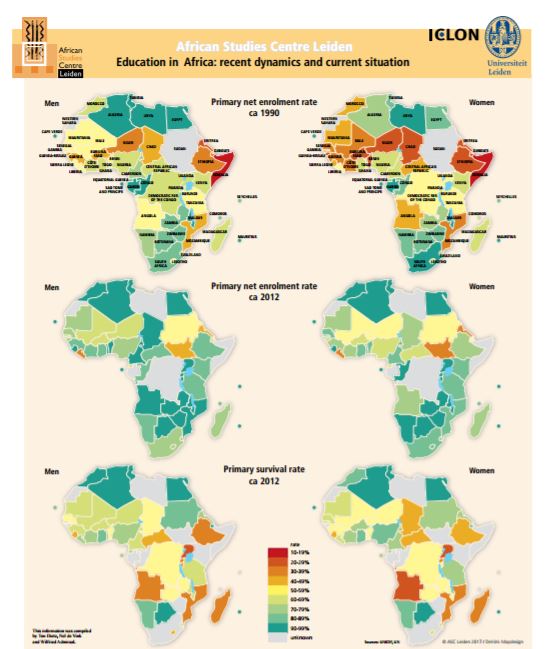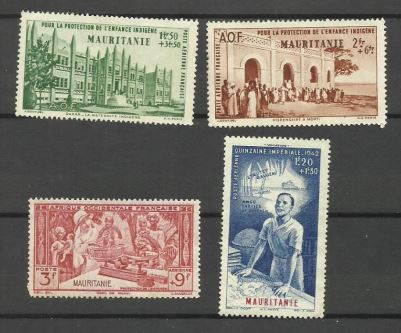New publications
New publications by ASCL staff and affiliates, and new books in our series, are frequently highlighted on this website. You may also use this RSS feed to keep informed. All recently added publications can be found in our database.
 In November 2014 the ASCL published a thematic map about Africa’s ‘no-go areas’. It was a contribution to a debate among Dutch universities about preventing their students and staff from going to Africa. It was the era of Ebola and of growing anxiety about the risks of being kidnapped. This new thematic map shows what has changed in Africa between late 2014 and early 2017. Clearly, the no-go areas in Africa have increased.
In November 2014 the ASCL published a thematic map about Africa’s ‘no-go areas’. It was a contribution to a debate among Dutch universities about preventing their students and staff from going to Africa. It was the era of Ebola and of growing anxiety about the risks of being kidnapped. This new thematic map shows what has changed in Africa between late 2014 and early 2017. Clearly, the no-go areas in Africa have increased.
 To coincide with the international NVAS Conference Education for Life in Africa, 19-20 May in The Hague, the ASCL has published a thematic map together with ICLON (Leiden University Graduate School of Teaching) about education in Africa, its recent dynamics and the current situation. The map gives an overview of primary, secondary and tertiary enrolment rates in 1990 and 2012, broken down by gender.
To coincide with the international NVAS Conference Education for Life in Africa, 19-20 May in The Hague, the ASCL has published a thematic map together with ICLON (Leiden University Graduate School of Teaching) about education in Africa, its recent dynamics and the current situation. The map gives an overview of primary, secondary and tertiary enrolment rates in 1990 and 2012, broken down by gender.
 Het Nederlandse buitenlandse beleid heeft de laatste jaren ingezet op ‘economische diplomatie’. Daarmee lijkt een stap gezet te zijn in de richting van diplomatie waarbij het Nederlandse economische belang meer centraal staat. Maar welke belangen zijn dat dan? Een preciezere framing van het beleid is gewenst, schrijven Ton Dietz (ASCL) en Rob van Tulder (Partnerships Resource Centre, Erasmus Universiteit), van economische diplomatie waarbij het er niet toe doet welke handelsstromen op gang worden gebracht, naar duurzame diplomatie, ofwel ‘diplomatie van duurzame ontwikkeling’, waarbij veel meer wordt nagedacht over de kwaliteit, de doelstelling en de lange termijn invulling van deze relaties.
Het Nederlandse buitenlandse beleid heeft de laatste jaren ingezet op ‘economische diplomatie’. Daarmee lijkt een stap gezet te zijn in de richting van diplomatie waarbij het Nederlandse economische belang meer centraal staat. Maar welke belangen zijn dat dan? Een preciezere framing van het beleid is gewenst, schrijven Ton Dietz (ASCL) en Rob van Tulder (Partnerships Resource Centre, Erasmus Universiteit), van economische diplomatie waarbij het er niet toe doet welke handelsstromen op gang worden gebracht, naar duurzame diplomatie, ofwel ‘diplomatie van duurzame ontwikkeling’, waarbij veel meer wordt nagedacht over de kwaliteit, de doelstelling en de lange termijn invulling van deze relaties.
 Current land tenure literature is mostly geared towards the various regimes of tenure, land registration, and establishing a cadastre in order to reduce transaction costs and guarantee investor confidence. The crucial role played by land brokers is rarely mentioned. Indeed, the term ‘land broker’ or equivalent is entirely missing from the land tenure lexicon. In this working paper, Marcel Rutten and Moses Mwangi share the most recent experiences in the emergence of formal land markets, and examine the underrated role of brokers in the transfer of land in Kenya.
Current land tenure literature is mostly geared towards the various regimes of tenure, land registration, and establishing a cadastre in order to reduce transaction costs and guarantee investor confidence. The crucial role played by land brokers is rarely mentioned. Indeed, the term ‘land broker’ or equivalent is entirely missing from the land tenure lexicon. In this working paper, Marcel Rutten and Moses Mwangi share the most recent experiences in the emergence of formal land markets, and examine the underrated role of brokers in the transfer of land in Kenya.
 The ASCL joins LeidenGlobal in putting 'heritage' in the limelight in 2017-2018 and has started a new online series of 'African Postal Heritage Papers'. While earlier papers (2015-2016) covered the five areas of German postal presence in Africa before World War I (Cameroon, Togo, German East Africa, German Southwest Africa and Morocco), three new papers have been added: the former Spanish Sahara, the Spanish Canary Islands and Mauritania.
The ASCL joins LeidenGlobal in putting 'heritage' in the limelight in 2017-2018 and has started a new online series of 'African Postal Heritage Papers'. While earlier papers (2015-2016) covered the five areas of German postal presence in Africa before World War I (Cameroon, Togo, German East Africa, German Southwest Africa and Morocco), three new papers have been added: the former Spanish Sahara, the Spanish Canary Islands and Mauritania.
 ASCL senior researcher Jan-Bart Gewald has written a chapter in the lavishly illustrated book 'Good Hope: South Africa and the Netherlands from 1600' that accompanies the exhibition with the same title in the Rijksmuseum (on show until 21 May 2017). ASCL honorary fellow Professor Emeritus Robert Ross is co-editor of the book and wrote the chapter about pre-colonial South Africa. The book explores what took place between 1652, when Jan van Riebeeck landed at the Cape, and Mandela's visit to Amsterdam in 1990.
ASCL senior researcher Jan-Bart Gewald has written a chapter in the lavishly illustrated book 'Good Hope: South Africa and the Netherlands from 1600' that accompanies the exhibition with the same title in the Rijksmuseum (on show until 21 May 2017). ASCL honorary fellow Professor Emeritus Robert Ross is co-editor of the book and wrote the chapter about pre-colonial South Africa. The book explores what took place between 1652, when Jan van Riebeeck landed at the Cape, and Mandela's visit to Amsterdam in 1990.
 This new article by Akinyinka Akinyoade, Chikbuike Uche and guest researcher Ogbuagu Ekumankama investigates attempts by Nigerian Breweries (a subsidiary of Heineken) to increase its use of local raw materials for beer brewing. It argues that the greatest threat to this initiative has been inconsistent Nigerian Government policies, especially with respect to promoting the cultivation of local raw materials such as sorghum, replacing imported barley.
This new article by Akinyinka Akinyoade, Chikbuike Uche and guest researcher Ogbuagu Ekumankama investigates attempts by Nigerian Breweries (a subsidiary of Heineken) to increase its use of local raw materials for beer brewing. It argues that the greatest threat to this initiative has been inconsistent Nigerian Government policies, especially with respect to promoting the cultivation of local raw materials such as sorghum, replacing imported barley.
 This study on Kapsiki-Higi tales compares two corpuses of stories collected over two generations. In this oral setting, folktales appear much more dynamic than usually assumed, depending on genre, performance and the memory characteristics of the tales themselves. ASCL senior researcher Wouter van Beek collected these tales in Northeastern Nigeria twice, with a time gap of two generations, in order to assess the dynamics of this oral transmission.
This study on Kapsiki-Higi tales compares two corpuses of stories collected over two generations. In this oral setting, folktales appear much more dynamic than usually assumed, depending on genre, performance and the memory characteristics of the tales themselves. ASCL senior researcher Wouter van Beek collected these tales in Northeastern Nigeria twice, with a time gap of two generations, in order to assess the dynamics of this oral transmission.

